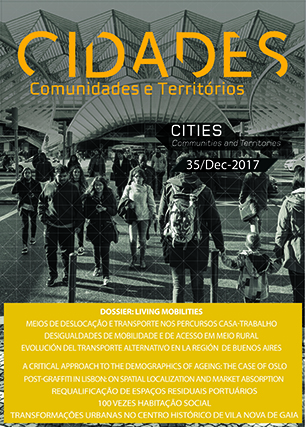Uma leitura de género sobre mobilidades e acessibilidades em meio rural
Palavras-chave:
género, mobilidade, acessibilidade, meio ruralResumo
Na contemporaneidade persistem fortes assimetrias na relação com o território (Carmo, 2014) sendo que em Portugal a zona interior é palco há várias décadas de um processo de despovoamento e perda de serviços (Fermisson, 2000). Por outro lado, a relação entre género e mobilidade apresenta especificidades dignas de nota visto que as mulheres têm necessidades e usos diferenciados de mobilidade e transporte e enfrentam obstáculos específicos (Hanson, 2013; Sales Oliveira, 2014). Neste sentido considerou-se relevante abordar a questão da mobilidade e acessibilidade rural de uma perspetiva de género no contexto português.
De molde a efetuar uma primeira abordagem exploratória ao tema, a investigação decorreu sobre a forma de estudo de caso, com recurso às técnicas de inquérito por questionário e de mobility mapping de uma aldeia da Beira Interior.
Encontrou-se uma composição social com maior diversidade do que o esperado mas ainda assim com uma forte presença de pessoas idosas e de baixas habilitações. A posse de carta de condução e de veículo automóvel particular é um recurso díspar e central na construção de uma assimetria de padrões e perfis de mobilidade.
Contudo, ao contrário do que seria de esperar, as mulheres não revelam menor mobilidade que os homens, pois apesar de serem mais elas quem não possui carta de condução ou veículo próprio/particular, são também quem mais frequentemente recorre a formas de mobilidades alternativas, nas quais as redes de contactos representam um importante fator.
Downloads
Publicado
Edição
Secção
Licença
CIDADES, Comunidades e Territórios by DINÂMIA'CET-Iscte is licensed under a CC-BY licence.







